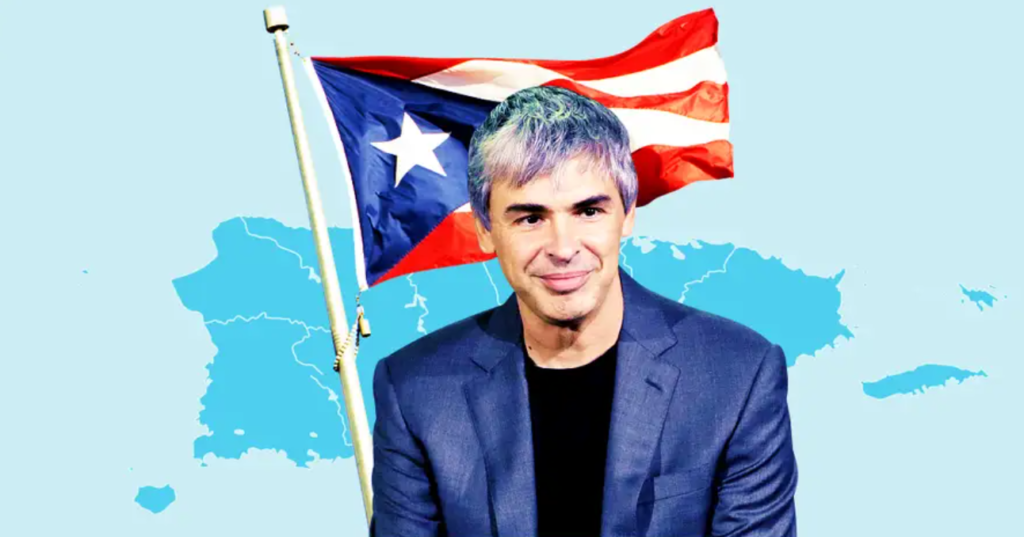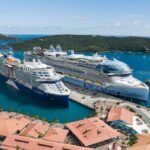SAN JUAN — Larry Page has spent the last decade amassing an impressive collection of private islands. It’s even bigger than we thought.
The Google cofounder purchased Cayo Norte, a large private island in Puerto Rico, in 2018, according to documents reviewed by Business Insider.
Page picked up the island for $32 million using a limited liability company named US Virgin Island Properties, which BI previously identified as one Page had used for buying islands across the Caribbean. Page and his wife, Lucinda Southworth, are “the trustees of the sole owners of US Virgin — the highest ranking position” at the entity, according to a legal motion filed by the LLC in 2017.
The purchase of Cayo Norte included a large section of the island for $28.7 million and another smaller section for $3.4 million, forming all of the purchasable land, for a total of just more than $32 million, according to property documents and a legal filing about the island.

Google cofounder Larry Page bought Cayo Norte, an island in Puerto Rico. Photo: Hugh Langley
Documents filed in Puerto Rico’s Fajardo property registry, reviewed by BI, also mention the sale was authenticated by Cristina Rosado on behalf of Assumption LLC. Assumption LLC is the parent entity encompassing many investments made by Page and Southworth through their family office, Koop. Rosado is a lawyer for a Bay Area firm that manages assets for family offices, including Page’s.
With Cayo Norte, Page has a total of five islands that are known to BI, spanning the Caribbean and the South Pacific. It’s unclear whether there are more. Larry Page and representatives from his family office didn’t respond to requests for comment from BI earlier this week.
Cayo Norte sits about 20 nautical miles east of Puerto Rico and just northeast of Culebra, another island that forms an archipelago. Cayo Norte is known for its white sandy beaches, surrounding coral reefs, and preserving a refuge for endangered sea turtles. It was previously owned by Dan Shelley, a local developer who acquired the island through SVI Investments in 2006 when it fell into auction, and the Padrón family for several decades before then.
The sale to Page was done privately and so quietly that, when questioned by BI, several local land officials in Puerto Rico were unaware it took place or who the new owner was. Some believed Cayo Norte was still owned by Shelley. Louis Padrón, a descendant of the family that previously owned the island before Shelley, told BI he had heard a rumor that a “Google executive” bought the island but didn’t know who it was.

Google cofounder Larry Page and his wife, the scientist Lucinda Southworth C Flanigan/FilmMagic
Page’s intentions for Cayo Norte are unclear. Richard Gautier, director of Culebra’s office for territorial planning, told BI there had been no applications for development on Cayo Norte since ownership changed in 2018.
Two locals said they had seen helicopters landing on Cayo Norte since then, and one of them said they had seen people hydrofoiling in the waters near the island. Page is a keen hydrofoiler. It’s a type of surfing where the board is lifted above the water using a wing-shaped fin, and it’s popular among tech execs, as BI previously reported.
Otherwise, there appears to be no development and little activity on the island. Padrón, who runs a water-taxi service in the area, said he had also seen no signs of building on the island.
Page’s interest in Cayo Norte spans back to at least 2013, according to a transcript of a deposition from a court case in 2016, in which Wayne Osborne, the CEO of the Page family office, was questioned about purchasing islands on behalf of the Google cofounder.
“In approximately 2013, Mr. Page expressed to me that he was interested in forming an entity to purchase an island in the US Virgin Islands, specifically, the islands of Great Hans Lollik, Little Hans Lollik, or Cayo Norte, near Puerto Rico,” Osborne said at the time, according to a copy of the transcript reviewed by BI.
Page purchased the Lollik islands, which sit 23 miles east of Cayo Norte, in 2014 for $23 million, BI previously reported.
It’s unknown whether Page, worth $117.2 billion, will keep Cayo Norte preserved in its natural state, but he should be well-attuned to the ecological sensitivities of the area.

Google’s cofounders, Larry Page and Sergey Brin. REUTERS/Kimberly White
In 2018, Southworth, a research geneticist, founded a marine-conservation startup named Oceankind, which has spent more than $100 million funding oceanic research. Oceankind is registered as an LLC, not a nonprofit, meaning it’s much harder to track the money going in and out.
Mary Ann Lucking, the director of a local coral-conservation NGO named CORALations, told BI that Cayo Norte had high ecological value to the area, including volcanic soil that could be detrimental if introduced to coastal waters.
“Our hope is that this guy doesn’t want this as an investment property that will be developed and ruined. If it can be protected with that north coast of Culebra, that would be ideal,” Lucking said. “The value of protecting a place like that is not seeing those impacts. Keeping it as is, with the vegetation that’s there.”
Cayo Norte adds to Page’s impressive portfolio of bolt-holes, which includes three others across the Caribbean. In 2020, Page also purchased a majority stake in the deed for Fiji’s heart-shaped Tavarua island, famed for its white-sand beaches and proximity to a top surfing spot.
In 2019, Page and his Google cofounder, Sergey Brin, announced they would step back from Alphabet and hand the reins to CEO Sundar Pichai. Since then, Page has almost entirely vanished from public life, yet he and Brin retain ultimate control of Alphabet thanks to a special stock with extra voting privileges.
Brin has recently become more involved with Google, helping to develop its latest large language model, Gemini.
Page continues to maintain his distance. A flying-car company that he backed named Kitty Hawk was shut down in 2022, but he financially supports another that recently renamed itself Pivotal. The company said it would start shipping its first eVTOL aircraft, or flying vehicle, to customers this June.
By HUGH LANGLEY/Business Insider



